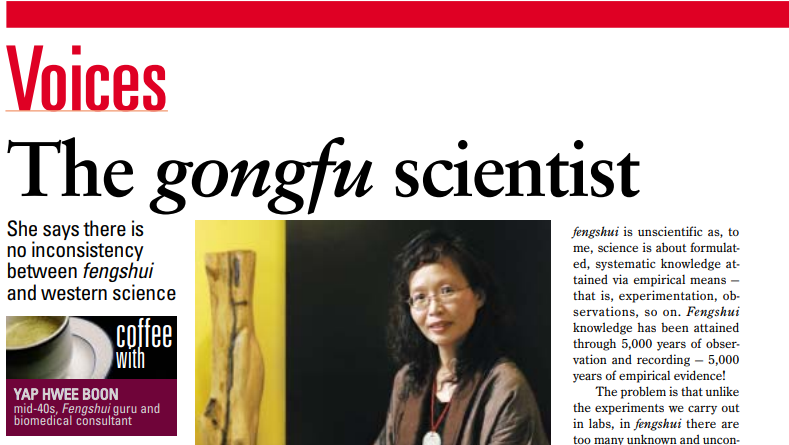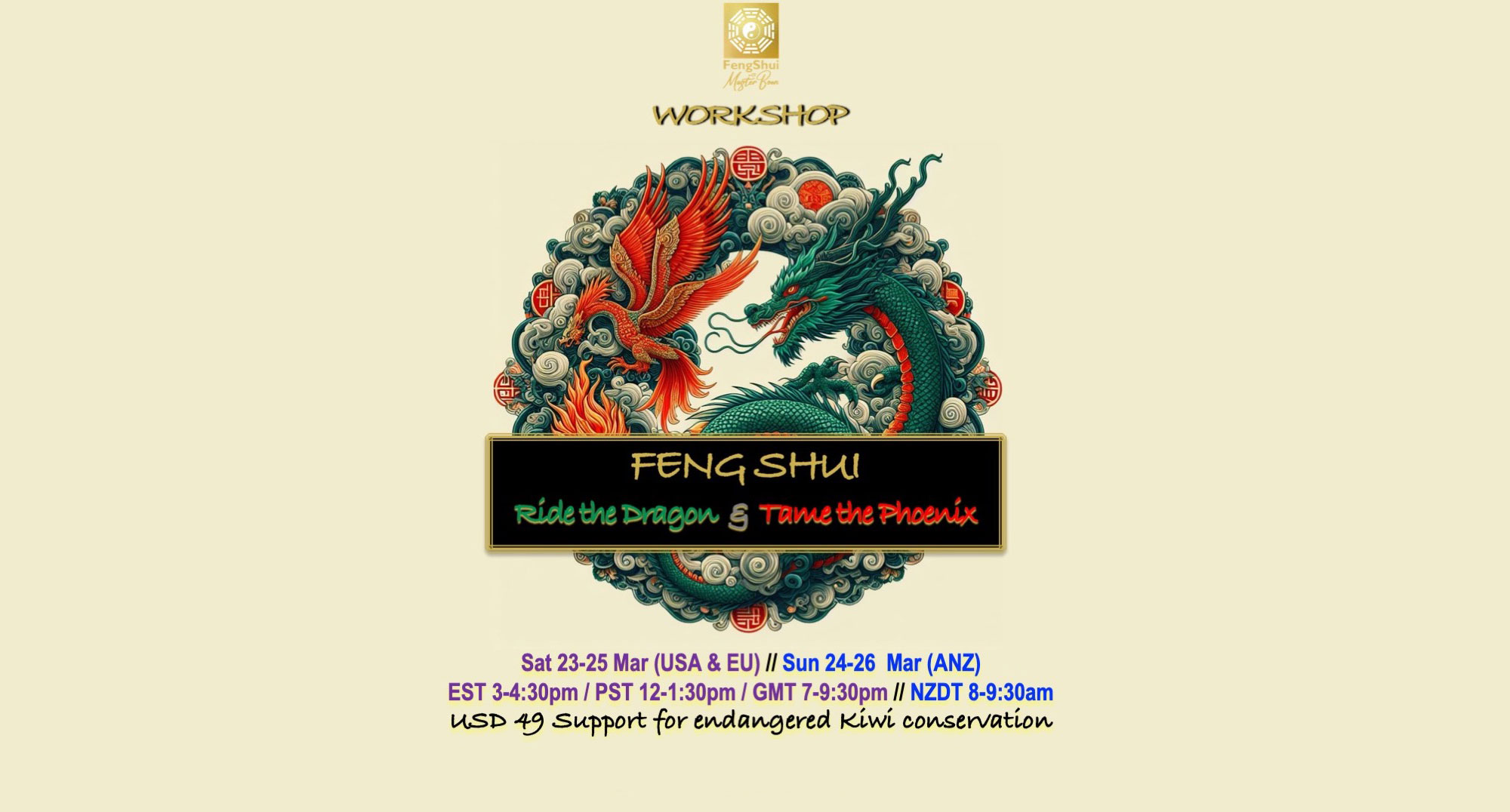The gongfu scientist, YAP HWEE BOON, mid-40s, Fengshui guru and biomedical consultant.
She says there is no inconsistency between fengshui and western science.
WHAT — or rather, who — do a biomedical research scientist, a gongfu instructor and a fengshui master have in common?
In the case of Ms Yap Hwee Boon, they are three persons in one. Malaysian-born Boon Yap (as she is affectionately known) may run her own biomedical consultancy and hold two Masters degrees, but as the daughter of fengshui and martial arts grand master Yap Cheng Hai, she hasn’t left family tradition behind.
She shares her dad’s vision of making classical fengshui easily accessible to the Western world.
In Singapore for the 3rd International Feng Shui Convention, she tells MICHAEL WEE about how Eastern and Western science can come together in harmony.
How has your father influenced you?
I grew up in a male-dominated environment, living with my father and my three brothers, so that made me very much a tomboy — perhaps this is why I picked wushu instead of ballet! My father was fun but strict. He made us learn wushu from a young age also because of health reasons, as my two older brothers had asthma. Fengshui
was part of our life: Father was always working on the house, changing something here and there, and moving our beds around. It’s a way of life that’s stuck with me since childhood.
When did you decide, like your dad, to go professional with fengshui?
When I had more free time after my studies, I decided to pursue fengshui more deeply and naturally, friends started asking me to assess their houses’ fengshui and things like that. It was the same way my father started out. But he also taught me that there needed to be an exchange of energies. You see, with fengshui, you’re influencing people’s luck and you need something in return or you’ll lose out … In today’s society, money of
course is a strong currency of energy.
You started training in Shaolin gongfu at age four. Was it tough?
(Laughs) It was only tough under my father, not with other instructors. He would say, “The way you hold your staff, people know you can’t fight” — and you knew you were finished. But it gives you discipline, which is useful in other aspects of life.
You’re also an accomplished artist and pianist, and you enjoy travelling and scubadiving. Why such diverse interests?
My father made me go for all sorts of lessons. Many of the teachers were my father’s wushu friends or masters. My father gave me more opportunities than I could ask for, ours being a lower-middle-income family. He wanted us to enjoy the opportunities he never had, and I didn’t want to waste it. Also, growing up with my brothers, we went swimming in tin mines, cycling and other outdoor activities, so it gave me a taste for adventure of that
sort.
Your father must have jumped at your decision to study science.
I actually wanted to be a naturalist — a David Attenborough, a Jane Goodall! But I guess my father’s main concern was for me to get a job. I knew I had to be practical because in Malaysia, you couldn’t get a job as a zoologist or a naturalist, observing monkeys everyday. Biomedical science was a practical compromise. I did have some fights with my dad. When I was going to Australia for my graduate studies, he didn’t let me apply for biological
science, but applied science, which was more career-oriented. When I got to Australia, I move to biological science. I’m glad my father accepted my decision when I phoned him and told him that was what I really
wanted to study.
Are Western science and fengshui truly incompatible?
I don’t think there’s any inconsistency between science and fengshui at all. It’s just that fengshui acts on intangible energy and science can’t explain or measure qi. It’s wrong to say fengshui is unscientific as, to me, science is about formulated, systematic knowledge attained via empirical means — that is, experimentation, observations, so on. Fengshui knowledge has been attained through 5,000 years of observation and recording — 5,000
years of empirical evidence! The problem is that unlike the experiments we carry out in labs, in fengshui there are
too many unknown and uncontrollable variables as fengshui deals with nature.
Has your knowledge of science helped you connect to your Western audiences on fengshui?
Yes, I think I’m able to bridge East and West because I’ve lived in both worlds. My science training has taught me to be logical and analytical and, in another way, it has given me credibility in the West. For people who think fengshui is a sort of superstition, they start getting curious as to why a practising scientist is talking about fengshui, and it makes them think twice about any preconceptions they have.
How is fengshui picking up in the West?
It’s becoming more popular. There has always been a fascination with the East, but people are also often dissatisfied with that the West has to offer, so they’re looking to the East for something beneficial to their
lives.
What motivates your work in biomedical science and fengshui?
I feel a sense of satisfaction when I’m able to help people with my knowledge of both biomedical science and fengshui. For example, if friends have problems, most of us would only be able to empathise. But I’m able to see if their problems are perhaps related to fengshui — and then I can do something. Same goes for biomedical
science. I’m involved in developing incredible life-saving devices. One was a stem-cell machine that gives children who otherwise would have died young a chance to live longer.
Both these fields are lifegiving and fulfilling.






